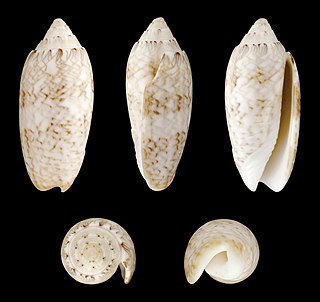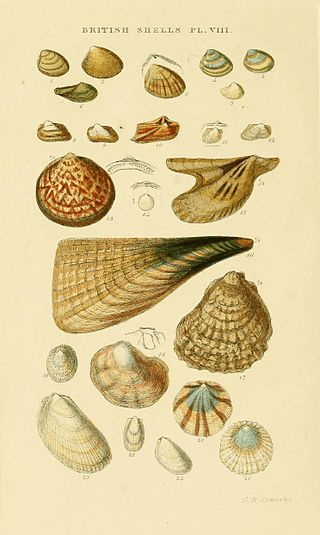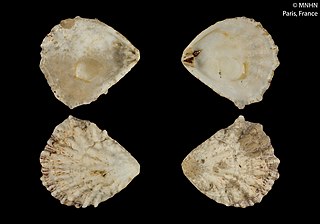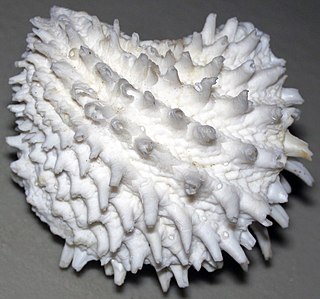
The lettered olive, Oliva sayana, is a species of large predatory sea snail, a marine gastropod mollusc in the family Olividae, the olive shells, olive snails, or olives.

Nuculidae is a family of small saltwater clams in the order Nuculida. Species in this family are commonly known as nut clams.

Perna perna, the brown mussel, is an economically important mussel, a bivalve mollusc belonging to the family Mytilidae. It is harvested as a food source but is also known to harbor toxins and cause damage to marine structures. It is native to the waters of Africa, Europe, and South America and was introduced in the waters of North America.

Petricola is a genus of saltwater clams, marine bivalve molluscs in the subfamily Petricolinae of the family Veneridae, the Venus clams.

Stramonita haemastoma, common name the red-mouthed rock shell or the Florida dog winkle, is a species of predatory sea snail, a marine gastropod mollusc in the family Muricidae, the rock snails.

Thelecythara floridana is a species of sea snail, a marine gastropod mollusk in the family Pseudomelatomidae, the turrids and allies.

Claremontiella nodulosa, common name: the blackberry drupe, is a species of sea snail, a marine gastropod mollusk in the family Muricidae, the murex snails or rock snails.

Hyotissa is a genus of large saltwater oysters, marine bivalve mollusks in the family Gryphaeidae.

Monoplex pilearis, common name the hairy triton, is a species of medium-sized predatory sea snail, a marine gastropod mollusk in the family Cymatiidae.

Tucetona pectinata, or the comb bittersweet, is a species of bivalve mollusc in the family Glycymerididae.

Limaria pellucida, the Antillean file shell, is a species of bivalve mollusc in the family Limidae. It can be found along the Atlantic coast of North America, ranging from North Carolina to the West Indies.

Plicatula gibbosa, commonly known as the Atlantic kitten's paw, is a species of bivalve mollusc in the family Plicatulidae.

Arcinella cornuta, or the Florida spiny jewelbox clam or Florida spiny jewel box, is a marine species of bivalve mollusc in the family Chamidae. It can be found along the coast of North Carolina to Florida, Gulf of Mexico, Caribbean Central America, and Venezuela.

Lamelliconcha circinata, common name the "purple venus clam", is a species of bivalve mollusc in the family Veneridae, the venus clams. This species can be found around the coasts of the islands in the West Indies.
Pitarenus cordatus, or the cordate venus clam, is a species of bivalve mollusc in the family Veneridae. It can be found throughout the Gulf of Mexico and the Florida Keys.

Cyrenidae is a family of clams in the order Venerida.
Stewartia floridana is a bivalve of the family Lucinidae that is chemosymbiotic with sulfur-oxidizing bacteria.

Lucina is a genus of saltwater clams, marine bivalve molluscs.

Cardites floridana, or the Broad-ribbed Carditid, is a marine clam in the family Carditidae. It can be found along the coasts of Florida, Central America, South America and the Gulf of Mexico.

Panopea bitruncata is a species of marine bivalve commonly known as the Atlantic geoduck or Atlantic geoduck clam. These clams like their more famous Pacific relative P. generosa have an enlarged siphon that can extend to great lengths or contract to just barely poke out of the shell. They are generally smaller in comparison to the Pacific species though still constitute a sizable mollusc as they cannot fully retract their siphon.


















